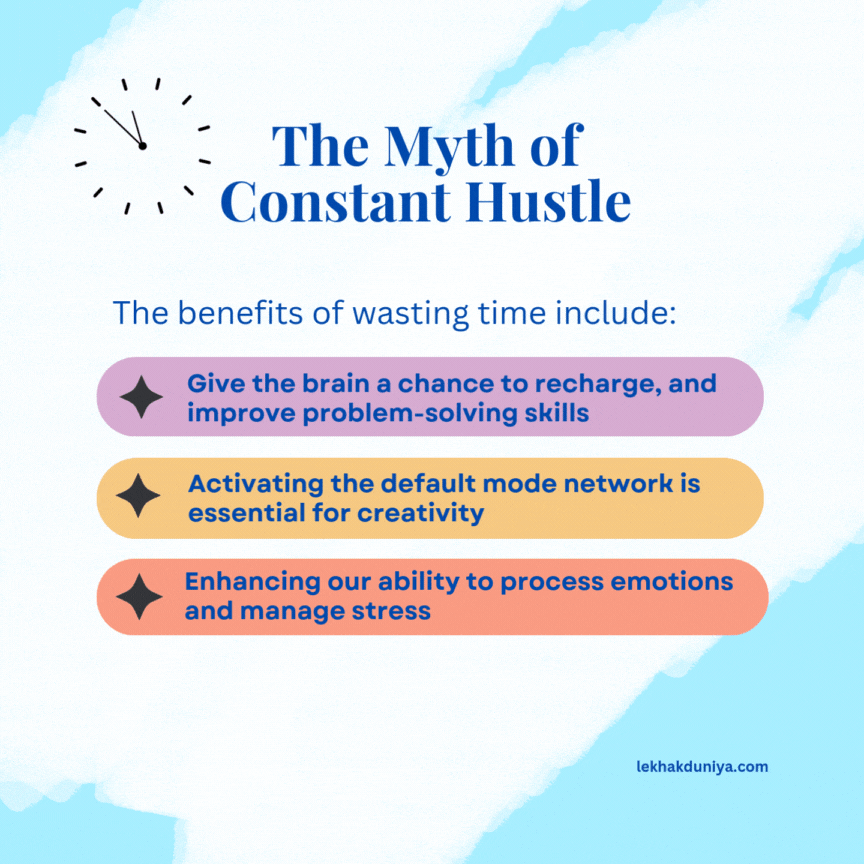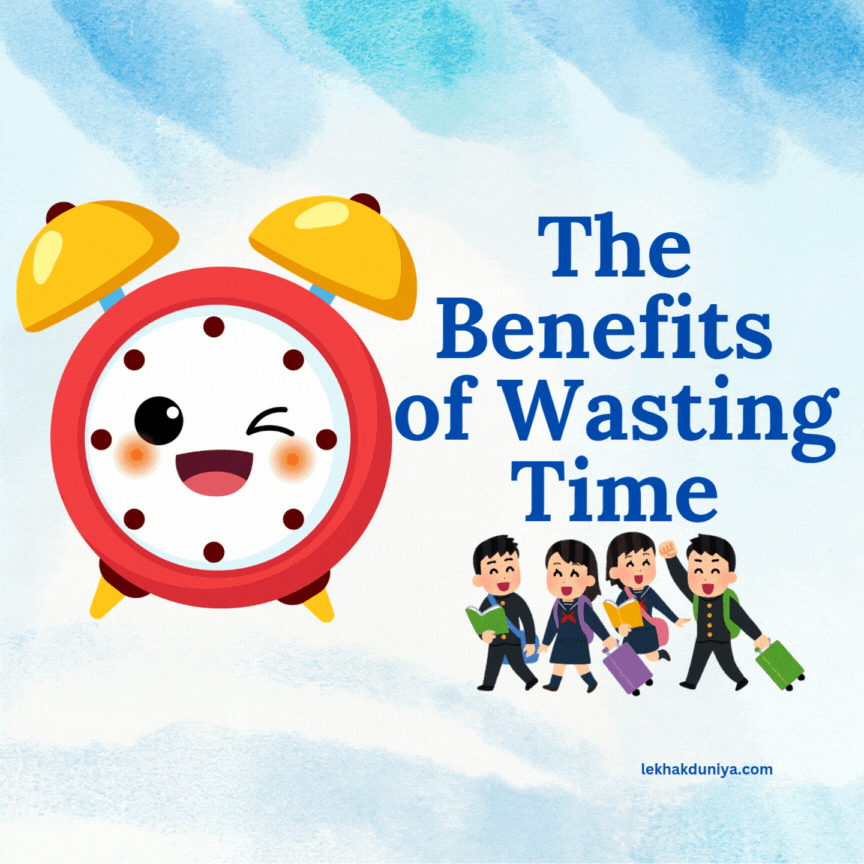Introduction: A Guilty Pleasure or Hidden Superpower?
We live in a world obsessed with productivity. Every moment of our day is scheduled, tracked, or optimized for maximum output. Wasting time is often labeled as lazy, unambitious, or even counterproductive. But what if I told you the benefits of wasting time are real—and they’re profound?
The truth is the benefits of wasting time go far beyond what we imagine. By allowing ourselves to step back, let our minds wander, and engage in unstructured activities, we unlock a wealth of mental, emotional, and creative rewards. From boosting focus to reducing stress, these idle moments can have a transformative impact on our lives.
I learned this lesson firsthand when I finally allowed myself to break free from the pressure of constant hustle. What I once dismissed as “wasting time” turned out to be a gateway to a happier, more fulfilling life. Let me walk you through how embracing idleness can change your life—and why the benefits of wasting time are too important to ignore.
Table of Contents
The Myth of Constant Hustle
In today’s hyper-connected world, hustle culture is the norm. We’re bombarded with messages urging us to work harder, do more, and never waste a second. But this relentless pursuit of productivity has its downsides. It leaves little room to explore the benefits of wasting time.
Research shows that overworking can lead to burnout, reduced focus, and even mental health challenges like anxiety. On the other hand, science shows that embracing downtime can have profound benefits.

The benefits of wasting time include:
- Giving the brain a chance to recharge, and improving problem-solving skills.
- Activating the default mode network is essential for creativity.
- We are enhancing our ability to process emotions and manage stress effectively.
By understanding the benefits of wasting time, we can challenge the societal belief that every minute needs to be productive.
The Positive Effects of Wasting Time
The benefits of wasting time are often underestimated. When you allow yourself to step away from your tasks and engage in unstructured activities, you unlock unique mental, emotional, and even physical advantages:

Here’s how it works:
- Improved Creativity: Your brain’s default mode network becomes active during idle moments, helping you generate fresh ideas and solve problems.
- Stress Reduction: Activities like daydreaming or enjoying a hobby calm your nervous system, lowering stress levels.
- Enhanced Focus: Taking deliberate breaks boosts concentration and helps you return to tasks with renewed energy.
- Fosters Emotional Well-Being: Wasting time can also improve your emotional resilience. It gives you space to reflect, process feelings, and gain clarity, which is crucial for mental health.
These benefits of wasting time aren’t just for artists or dreamers. They apply to anyone looking to live a healthier, more balanced life.
Personal Lessons from Embracing Idleness
For years, I prided myself on being busy. My days were filled with back-to-back meetings, tight deadlines, and a constant drive to achieve more. Yet, despite my packed schedule, I felt unfulfilled and creatively blocked.
Everything changed during a vacation when I allowed myself to waste time for the first time in years. With no agenda, I spent days napping, taking long walks, and simply staring at the ocean. What I once considered laziness turned out to be transformative.
The benefits of wasting time became immediately clear:
- My imagination flourished, and I came back to work brimming with innovative ideas.
- I felt more present and connected to loved ones.
- I discovered a sense of joy in life’s small, unplanned moments.
Idleness taught me that life isn’t just about doing—it’s about being.
Practical Ways to ‘Waste Time’ Effectively
If you’re ready to experience the benefits of wasting time for yourself, here are some guilt-free ways to get started:

- Daydream Freely: Give your mind space to wander. This idle state fosters creativity and self-reflection.
- Engage in Joyful Hobbies: Immerse yourself in hobbies like painting, baking, or gardening—not for perfection, but for the sheer joy and relaxation they bring to the moment.
- Take Unplanned Walks: Leave your phone behind and stroll aimlessly. These moments of solitude can clear your mind and let your thoughts flow naturally.
- Enjoy the Outdoors: Spend time in nature, whether it’s watching clouds, listening to birds, sitting in a park, or simply breathing fresh air can be surprisingly rejuvenating.
- Disconnect from Devices: Turn off screens for an hour or two and enjoy real-life moments or offline activities like reading or journaling.
By intentionally “wasting” time, you can tap into the many benefits of wasting time while still feeling productive in the long run.
Overcoming the Guilt of Wasting Time
One of the biggest barriers to enjoying the benefits of wasting time is guilt. Society teaches us to equate idleness with failure, but this couldn’t be further from the truth.

To overcome this:
- Reframe Your Thinking: View idleness as self-care, not failure. Rest is a fundamental recharge for both your mind and body, helping you function at your best.
- Start Small: Schedule short breaks into your day to normalize downtime.
- Remember the Benefits: Remind yourself that the benefits of wasting time include better creativity, mental health, and focus.
Guilt only serves to hold you back. The benefits of wasting time go beyond personal fulfillment. They help you bring your best self forward, enhancing both your performance at work and your connections with others.
The Healing Power of Time Wasted
When you embrace the benefits of wasting time, you unlock a unique kind of healing. These moments of idleness create opportunities for self-discovery, mindfulness, and emotional processing.
Unplanned time also deepens connections with others. Think about the laughter shared over a spontaneous game or the meaningful conversation that happens when you’re simply hanging out. These experiences remind us that life’s greatest joys often arise from unscheduled moments.
The New Normal: Redefining Productivity
True productivity isn’t about how much you do but how balanced your life feels. By integrating rest into your routine, you can achieve more with less effort.
This doesn’t mean abandoning ambition. Instead, it’s about working smarter by integrating regular downtime into your routine. When you permit yourself to waste time, you not only protect your mental health but also enhance your overall productivity.
The benefits of wasting time remind us that life isn’t a race. It’s about finding harmony between action and stillness.
Final Thoughts: Waste Wisely, Live Fully
The benefits of wasting time are undeniable: from sparking greater creativity, reduced stress, and a renewed sense of purpose. Life isn’t about cramming every second with activity—it’s about finding joy and meaning in every moment, even the idle ones.
So, the next time you catch yourself staring at the sky or lost in thought, don’t rush back to your to-do list. Embrace it. Because time isn’t just worth spending—it’s worth wasting.
Embrace the Benefits of Wasting Time
Are you ready to experience the transformative power of idleness? Start small. Pick a day this week to let go of your schedule for an hour or two. Whether it’s taking an aimless walk, doodling, or enjoying a cup of coffee without multitasking, these simple acts of “wasting time” can enrich your life in ways you never expected. Allow yourself to wander, daydream, or simply do nothing—guilt-free.
If this blog inspired you, share it with a friend or colleague who might need a reminder that not all time needs to be productive. Let’s start a conversation about redefining success, one “wasted” moment at a time.
And don’t forget to share your thoughts! What’s your favorite way to waste time? Drop a comment below—we’d love to hear how you find balance in the chaos.



